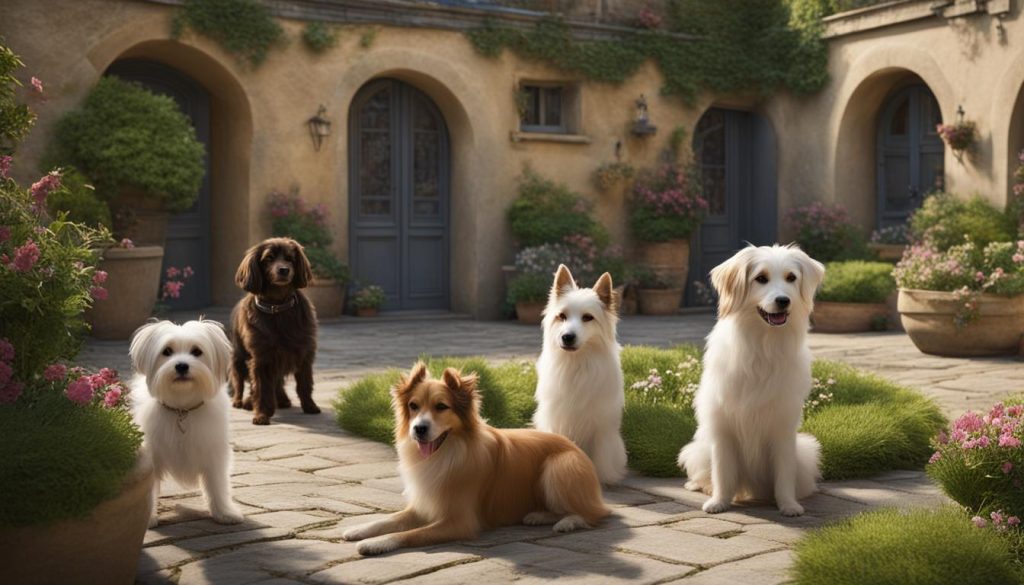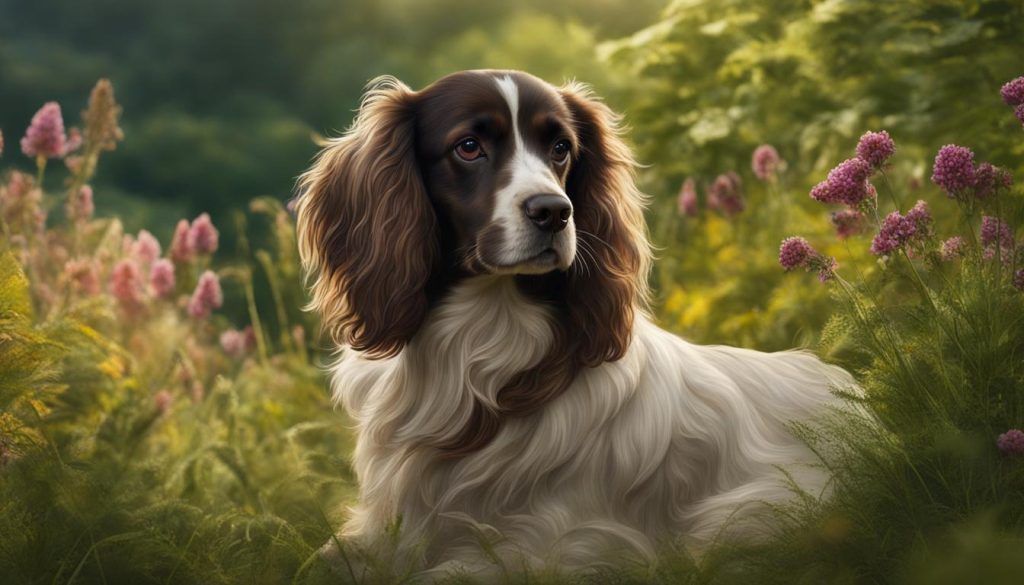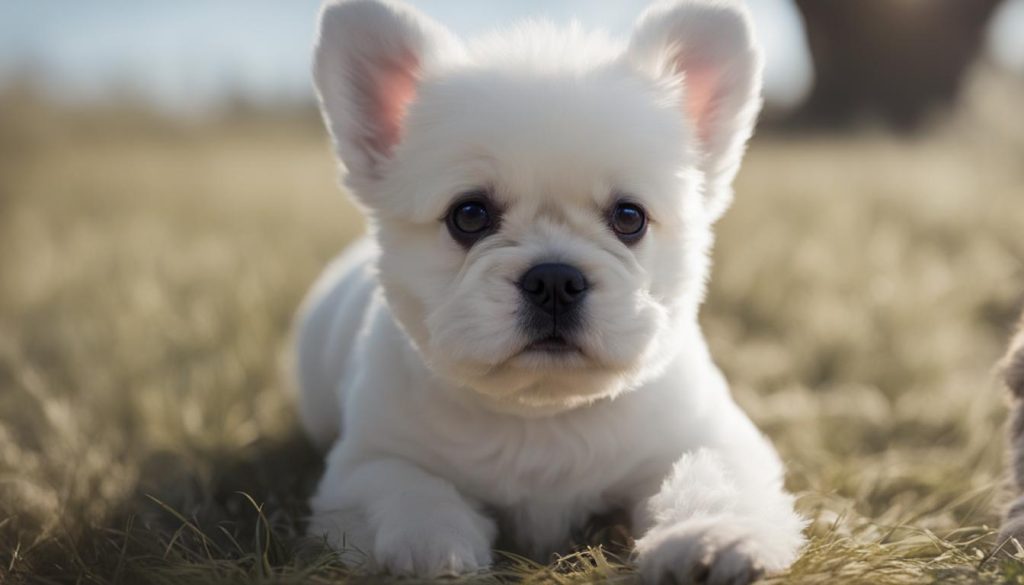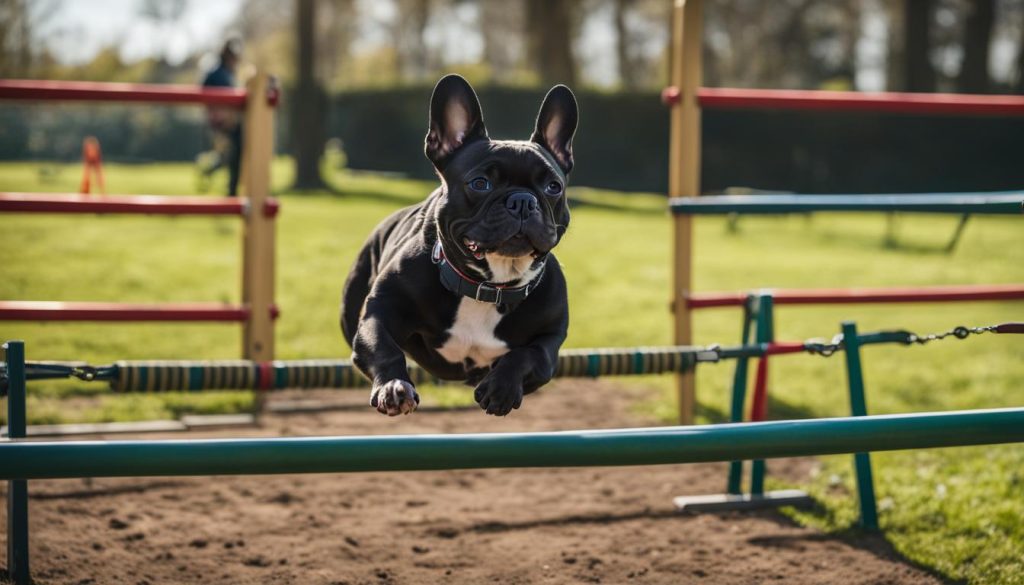I’m excited to share with you this comprehensive guide on French dog breeds. As an American pet lover, learning about different dog breeds can be an enriching experience. In this section, we will delve into the world of French dog breeds, providing you with valuable information about their characteristics, temperament, size, and grooming needs.
French Bulldogs, in particular, have captured the hearts of many dog enthusiasts worldwide with their adorable appearance and friendly nature. Whether you’re interested in small or large French dog breeds, this guide will help you understand the different types and choose the perfect furry companion for your home.
Key Takeaways:
- French dog breeds are known for their unique characteristics and friendly nature.
- Understanding the size, temperament, and grooming needs of a French dog breed is essential when choosing the right companion.
- French Bulldogs are one of the most popular French dog breeds worldwide.
- There are both small and large French dog breeds to suit different lifestyles and preferences.
- Considering adoption is a wonderful option for those interested in French dog breeds.
The Popularity of French Dog Breeds

French dog breeds have captured the hearts of pet lovers around the world, and their popularity continues to rise. These charming and unique breeds have become favorites among dog enthusiasts for their distinctive characteristics and qualities.
One of the most popular French dog breeds is the French Bulldog. Known for their compact size, adorable appearance, and friendly nature, French Bulldogs have quickly become a beloved choice for many families. Their playful and affectionate temperament makes them ideal companions for both individuals and families with children.
Another top French dog breed is the Bichon Frise. These small, fluffy dogs are known for their cheerful personalities and hypoallergenic coats. Their friendly and sociable nature makes them excellent family pets, and their adaptability allows them to thrive in various living environments.
French dog breeds have unique qualities and characteristics that make them highly sought after by pet lovers. From the charming Bichon Frise to the elegant Great Pyrenees, these breeds offer a diverse range of options for those considering a French dog as a furry companion.
When it comes to popularity, the French dog breed that stands out is the Great Pyrenees. These majestic and gentle giants are well-loved for their loyalty and protective nature. With their striking appearance and calm demeanor, Great Pyrenees make an impressive addition to any family.
Overall, the popularity of French dog breeds can be attributed to their adorable looks, friendly personalities, and unique qualities. Whether you’re looking for a small and playful companion like the French Bulldog or a gentle giant like the Great Pyrenees, these top French dog breeds are sure to bring joy and companionship to your life.
French Dog Breeds for Adoption
If you’re considering adding a French dog breed to your family, adoption is a wonderful option to consider. Many French dog breeds are in need of loving homes, and adopting can be a fulfilling and rewarding experience. By adopting a French dog breed, not only are you providing a forever home for a deserving dog, but you are also contributing to the important work of rescue and rehoming organizations.
There are several resources and organizations dedicated to finding homes for French dog breeds. Local animal shelters and rescue groups often have French dogs available for adoption. These organizations carefully screen potential adopters to ensure a good match between the dog and the adoptive family. They also provide valuable information about the dog’s personality, history, and any special needs or considerations.
Benefits of Adopting a French Dog Breed
- Save a life: By adopting a French dog breed, you are giving a second chance to a dog in need.
- Ready for a forever home: Adopted dogs are typically already spayed or neutered, vaccinated, and may have received basic training.
- Cost-effective: Adoption fees are often lower than purchasing a dog from a breeder.
- Support rescue organizations: By adopting, you are directly supporting the work of rescue organizations and helping them continue their important mission.
“Adopting a French dog breed is a win-win situation. You provide a loving home for a dog in need, and in return, you gain a loyal and devoted companion.”
Before deciding to adopt, it’s important to consider the specific needs and requirements of the French dog breed you are interested in. Some breeds may have specific exercise or grooming needs, while others may be better suited for households with children or other pets. Take the time to research and educate yourself about the breed’s characteristics to ensure a successful adoption.
| Breed | Size | Temperament |
|---|---|---|
| French Bulldog | Small | Friendly, affectionate |
| Bichon Frise | Small | Playful, sociable |
| Barbet | Medium | Intelligent, loyal |
| Great Pyrenees | Large | Gentle, protective |
By considering adoption, you have the opportunity to provide a loving home for a French dog breed and make a positive impact on their lives. Whether you choose a small, medium, or large French dog breed, adoption is a rewarding experience that brings joy and companionship to both the dog and the adoptive family.
Small French Dog Breeds

When it comes to French dog breeds, not all of them are large and imposing. In fact, there are several small French dog breeds that make wonderful companions for those who prefer a smaller furry friend. These compact canines may be small in size, but they are big on personality and charm.
One popular small French dog breed is the French Bulldog. With their adorable wrinkled face, bat-like ears, and playful nature, French Bulldogs are beloved by many. Despite their small stature, they have a sturdy build and a confident demeanor. They are known for being affectionate, sociable, and great with children, making them the perfect family pet.
“The French Bulldog is a small dog with a big heart. Their unique appearance and friendly nature make them a popular choice for families and individuals alike.”
Another small French dog breed is the Papillon. Known for their distinctive butterfly-like ears, the Papillon is an intelligent and energetic breed. They are highly trainable and excel in obedience and agility competitions. Despite their small size, they have a lot of energy and need regular exercise to keep them happy and healthy.
| Small French Dog Breeds | Size | Temperament | Key Features |
|---|---|---|---|
| French Bulldog | Small | Affectionate, Sociable | Adorable appearance, Friendly nature |
| Papillon | Small | Intelligent, Energetic | Butterfly-like ears, Trainable |
| Bichon Frise | Small | Cheerful, Playful | Curly white coat, Hypoallergenic |
| Malamute | Small | Sociable, Alert | Compact size, Easy to groom |
The Bichon Frise is another small French dog breed that is known for its cheerful and playful personality. With their curly white coat, they are often compared to fluffy cotton balls. Bichon Frises are intelligent and easy to train, making them a great choice for first-time dog owners. They are also hypoallergenic, meaning they are less likely to cause allergies in sensitive individuals.
Lastly, the Maltese is a small French dog breed that is known for its sociable and alert nature. Despite their small size, they are fearless and make excellent watchdogs. The Maltese has a compact size and a long, silky white coat that requires regular grooming to keep it looking its best.
Whether you’re looking for a friendly companion, an intelligent and energetic breed, or a hypoallergenic dog, small French dog breeds offer a variety of options. Their small size doesn’t diminish their charm, loyalty, and unique personality traits. Consider these small French dog breeds and find the perfect four-legged friend to bring joy and companionship to your life.
Large French Dog Breeds

If you’re looking for a larger French dog breed that can match your active lifestyle, there are several notable options to consider. These breeds are known for their impressive size, strength, and unique characteristics that set them apart from smaller counterparts. Whether you’re seeking a gentle giant or a majestic companion, the large French dog breeds listed below offer a range of temperaments and qualities to suit different preferences.
Breed 1: Great Pyrenees
The Great Pyrenees is a majestic and gentle breed originally bred to protect livestock. These dogs are known for their massive size and thick, white coats. Despite their imposing appearance, they possess a calm and patient temperament and make excellent family pets. Great Pyrenees require moderate exercise and regular grooming to maintain their coat’s cleanliness and prevent matting.
Breed 2: Dogue de Bordeaux
Also known as the Bordeaux Mastiff or French Mastiff, the Dogue de Bordeaux is a powerful and muscular breed with a distinctive wrinkled face and imposing presence. They are known for their loyalty, affection, and protective nature. Despite their size, they are gentle and patient, making them well-suited for families with children. Regular exercise and a balanced diet are essential for maintaining their health and weight.
Breed 3: Briard
The Briard is a versatile and intelligent breed known for its striking appearance and protective nature. These dogs are medium to large in size, with a dense, curly coat that requires regular grooming. Briards are highly trainable and have been used as herding dogs, search and rescue dogs, and even military working dogs. They are loyal, loving, and make excellent companions for active individuals or families.
These are just a few examples of larger French dog breeds that offer distinct qualities and characteristics. When considering a large breed, it’s important to remember that they require ample space, regular exercise, and proper training to ensure they thrive in a home environment. Whether you’re drawn to the majestic Great Pyrenees, the powerful Dogue de Bordeaux, or the versatile Briard, these large French dog breeds can bring joy, companionship, and a touch of elegance to your life.
Rare French Dog Breeds

France is home to not only the well-known French Bulldog and Bichon Frise but also a variety of rare and unique dog breeds. These lesser-known breeds offer a special charm and distinct characteristics that set them apart from their more popular counterparts. If you’re looking for a truly unique companion, consider one of these rare French dog breeds.
The Picardy Spaniel
The Picardy Spaniel is a versatile and intelligent breed originally bred for hunting in the Picardy region of France. With their distinctive, tousled coat and strong, muscular build, they are well-suited to both land and water activities. Picardy Spaniels are known for their friendly and gentle nature, making them great family pets as well as skilled hunting companions.
The Barbet
The Barbet is a water dog that has been around for centuries. This medium-sized breed is characterized by its curly, hypoallergenic coat, which is perfect for those with allergies. Barbets are known for their intelligence and versatility, excelling in various activities such as water retrieving, obedience, and even therapy work. Their calm and affectionate nature makes them wonderful companions for individuals and families alike.
The Beauceron
The Beauceron, also known as the French Shepherd, is a large and powerful breed that has a long history of working alongside farmers and shepherds in France. With their strong guarding instincts and loyalty, Beaucerons make excellent protectors and working dogs. They are highly intelligent and trainable, excelling in tasks such as herding, obedience, and search and rescue. Despite their imposing size, Beaucerons also have a loving and affectionate side, making them a great addition to an active and experienced family.
The Pyrenean Mastiff
The Pyrenean Mastiff, originally from the Pyrenees Mountains, is a majestic and noble breed. Known for their impressive size and strength, they were historically used to guard livestock and property. Pyrenean Mastiffs are gentle giants with a calm and patient temperament. They are devoted and loving towards their families, making them excellent companions. However, due to their large size and protective nature, they require proper socialization and training from an early age.
| Breed | Origin | Size | Temperament |
|---|---|---|---|
| Picardy Spaniel | France | Medium | Friendly, gentle |
| Barbet | France | Medium | Intelligent, versatile |
| Beauceron | France | Large | Loyal, protective |
| Pyrenean Mastiff | France | Large | Gentle, noble |
French Dog Breeds: Temperament and Characteristics

French dog breeds possess a unique set of temperament and characteristics that make them stand out from other breeds. Whether you’re considering a playful French Bulldog or a regal Great Pyrenees, understanding their traits is essential to providing them with the care and companionship they need.
One standout characteristic of French dog breeds is their friendly and sociable nature. They are known for being affectionate and loving, making them excellent family pets. These breeds thrive on human interaction and enjoy being a part of the family unit. Whether it’s snuggling on the couch or accompanying you on outdoor adventures, they are always eager to be by your side.
In terms of intelligence, French dog breeds are highly trainable and quick to learn. They have a natural curiosity and love to explore their surroundings. This makes them receptive to training and eager to please their owners. With consistent positive reinforcement and reward-based training methods, French dog breeds can quickly pick up commands and behaviors.
“French dog breeds have a unique charm and adaptability that sets them apart. They are known for their loyalty and willingness to protect their loved ones.”
Additionally, the adaptability of French dog breeds is worth noting. They can thrive in various living environments, from apartments to spacious homes. While some breeds may have a higher energy level and require more exercise, overall, French dog breeds are adaptable to different lifestyles. However, it’s important to ensure they receive adequate mental and physical stimulation to prevent boredom and behavioral issues.
Overall, French dog breeds exhibit a set of characteristics that make them cherished companions. Their friendly nature, intelligence, and adaptability make them suitable for a range of households. Whether you’re a first-time dog owner or an experienced pet lover, these breeds can bring joy and companionship to your life.
French Dog Breeds: Health and Care
When it comes to keeping your French dog breed healthy and happy, there are a few key factors to consider. Understanding the specific health needs and how to properly care for your furry friend will ensure a long and fulfilling life together. Here are some important aspects of health and care for French dog breeds.
Common Health Issues
French dog breeds, like any other breed, can be prone to certain health issues. It’s essential to be aware of these potential concerns and take proactive steps to prevent or manage them. Some common health issues that can affect French dog breeds include:
- Brachycephalic Syndrome: This condition is characterized by the shortened muzzle and can lead to respiratory problems. Keeping your French dog breed in a cool and comfortable environment is crucial to prevent overheating and breathing difficulties.
- Allergies: French dog breeds may be prone to allergies, which can manifest as skin irritations or respiratory issues. Regular grooming and monitoring for any signs of allergies are important to ensure your furry friend stays healthy and comfortable.
Regular check-ups with a veterinarian and maintaining a healthy lifestyle through proper diet and exercise can help minimize the risk of these health issues and ensure early detection and treatment if necessary.
Grooming, Exercise, and Nutrition
Grooming is an important aspect of caring for your French dog breed. Depending on the specific breed, grooming needs may vary. Regular brushing, nail trimming, and ear cleaning are essential to maintain good hygiene. Some French dog breeds may require professional grooming to keep their coats in optimal condition.
Exercise is crucial for keeping your French dog breed physically and mentally stimulated. Daily walks, playtime, and interactive toys can help prevent boredom and promote a healthy weight. However, it’s important to consider the breed’s exercise requirements and not overexert them, especially in extreme weather conditions.
Nutrition plays a vital role in the overall health of your French dog breed. Providing a balanced and appropriate diet, tailored to their specific needs, is essential. Consult with your veterinarian to determine the best diet plan and portion sizes for your furry friend.
Training is an essential part of owning a French dog breed. These breeds are known for their intelligence and eagerness to please, making them highly trainable. To ensure successful training, it’s important to understand the characteristics and behavior of French dog breeds.
French dog breeds have a reputation for being friendly, sociable, and adaptable. They are generally quick learners and respond well to positive reinforcement techniques. This means that using rewards, such as treats or praise, can be highly effective in motivating them during the training process.
Training French Dog Breeds: Tips and Techniques

- Start early: Begin training your French dog breed as early as possible to establish good habits and behaviors.
- Be consistent: Set clear rules and boundaries, and be consistent in enforcing them. This will help your dog understand what is expected of them.
- Use positive reinforcement: Reward your dog with treats and praise when they exhibit desired behaviors. This will reinforce the behavior and motivate them to continue learning.
- Be patient and persistent: Training takes time and effort. Stay patient and consistent, and remember that progress may not always be linear.
- Socialize your dog: Expose your French dog breed to different environments, people, and other animals from a young age. This will help them develop good social skills and prevent behavioral issues.
Remember that every dog is unique and may have their own personality and learning style. Tailor your training approach to suit your individual dog and their needs.
By investing time and effort into training, you can ensure that your French dog breed becomes a well-behaved and obedient companion. Remember to always use positive reinforcement techniques and seek professional help if needed. With consistency, patience, and love, you can enjoy a harmonious relationship with your French dog breed.
Wrapping Up
In conclusion, French dog breeds are beloved for their unique qualities and characteristics. Whether you’re considering a small or large French dog breed, adoption or working with a breeder, it’s important to understand their temperament, health needs, and training requirements. By following the information and tips provided in this guide, you can make an informed decision and find the perfect French dog breed to bring joy and companionship to your life.
FAQ
What are some popular French dog breeds?
Some popular French dog breeds include the French Bulldog, Bichon Frise, Great Pyrenees, and Dogue de Bordeaux.
Are there French dog breeds available for adoption?
Yes, there are French dog breeds available for adoption. Many organizations specialize in rescuing and rehoming these unique dogs.
What are some small French dog breeds?
Some small French dog breeds include the French Bulldog, French Brittany, and Bichon Frise.
What are some large French dog breeds?
Some large French dog breeds include the Great Pyrenees, Dogue de Bordeaux, and Great Dane.
Are there any rare French dog breeds?
Yes, there are rare French dog breeds, such as the Picardy Spaniel and Barbet, that deserve recognition.
What are the common characteristics of French dog breeds?
French dog breeds are known for their friendly nature, intelligence, and trainability.
How do I care for the health of a French dog breed?
Proper health care for French dog breeds includes regular grooming, exercise, and a balanced diet. They may also have specific health issues to be aware of, such as brachycephalic syndrome and allergies.
How should I train a French dog breed?
French dog breeds are intelligent and eager to please, making them responsive to training. Basic obedience commands and socialization are important for their training and behavior development.






